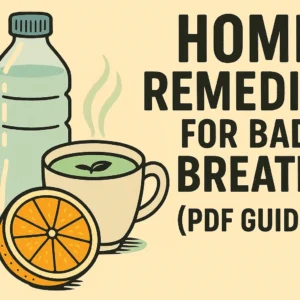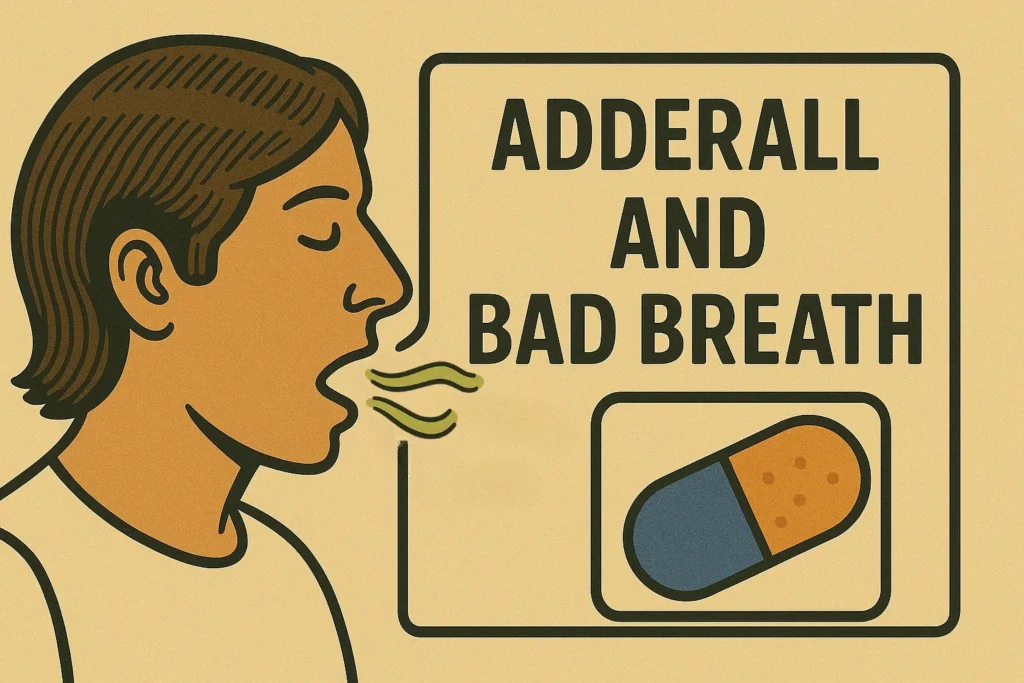Introduction
Adderall, a commonly prescribed medication for Attention Deficit Hyperactivity Disorder (ADHD) and narcolepsy, is known for its effectiveness in improving focus and alertness. However, like many medications, it comes with a range of side effects.
One particularly uncomfortable but less frequently discussed issue is bad breath, a condition that can significantly affect social and personal confidence. This article explores the connection between Adderall and bad breath, its causes, and practical remedies to manage it effectively.
How Adderall Affects Oral Health
Adderall works by stimulating the central nervous system, increasing levels of dopamine and norepinephrine in the brain. While beneficial for managing ADHD symptoms, this stimulation can reduce the body’s production of saliva. Since saliva is essential for maintaining oral hygiene, its reduction can lead to xerostomia (chronic dry mouth), a known contributor to bad breath.
Another contributing factor is vasoconstriction, a common effect of stimulants like Adderall. This narrows blood vessels, limiting the flow of nutrients to the salivary glands, which further suppresses saliva production.
The Role of Saliva in Maintaining Fresh Breath
Saliva plays a critical role in oral health by:
- Washing away food particles.
- Neutralizing acids produced by bacteria in the mouth.
- Preventing bacterial overgrowth on the tongue, gums, and teeth.
When saliva production decreases, bacteria thrive, leading to halitosis (bad breath). Food particles are not adequately cleared, and volatile sulfur compounds (VSCs) produced by bacteria become more concentrated, causing noticeable odor.
Understanding “Adderall Tongue” and Other Oral Symptoms
A condition informally referred to as “Adderall tongue” describes a dry, sore, or swollen tongue often accompanied by:
- Cracking or white patches on the tongue.
- A metallic or altered taste in the mouth.
- Biting or chewing on the tongue due to anxiety or restlessness.
These symptoms not only cause discomfort but also contribute to oral health issues that can aggravate bad breath. Bruxism (teeth grinding), another side effect of stimulant use, can damage tooth enamel and irritate oral tissues, compounding the problem.
Identifying Bad Breath Caused by Adderall
If you’re unsure whether Adderall is contributing to your bad breath, look for the following signs:
- A persistently dry mouth, even after drinking water.
- A sticky feeling, especially in the morning.
- White coating on the tongue.
- Increased thirst or cracked lips.
While these symptoms can have multiple causes, their emergence after starting Adderall is a strong indicator of a medication-related issue.
Effective Strategies to Combat Adderall-Related Bad Breath
Fortunately, there are several practical and medically endorsed strategies to manage bad breath caused by Adderall:
Stay Hydrated : Drink water consistently throughout the day to compensate for reduced saliva production. Small, frequent sips are more effective than occasional large drinks.
Chew Sugar-Free Gum or Mints : Gums containing xylitol stimulate saliva production and help neutralize acids, improving overall breath quality.
Avoid Alcohol-Based Mouthwashes : These can dry out the mouth further. Opt for alcohol-free or moisturizing mouth rinses formulated for dry mouth relief.
Practice Nasal Breathing : Mouth breathing worsens dry mouth. Try to breathe through your nose, especially during sleep, to help retain oral moisture.
Watch Your Diet : Limit intake of caffeinated drinks (which dehydrate), alcohol (which dries the mouth and interacts with Adderall) and sugary snacks (which feed bacteria in the mouth).
Maintain Rigorous Oral Hygiene : Brush twice daily with fluoride toothpaste, floss regularly, and consider using a tongue scraper to remove bacteria that contribute to odor.
Use Saliva Substitutes or Oral Sprays : Products like Biotène or ACT Dry Mouth lozenges can provide immediate relief and protect oral tissues.
Consult a Healthcare Provider : If symptoms persist, consult your dentist or prescribing doctor. Adjusting the dosage or switching medications may help reduce side effects.
Conclusion
While Adderall is an effective treatment for ADHD and related conditions, its impact on oral health (particularly bad breath) can be frustrating. Understanding the causes, like dry mouth and bacteria buildup, helps you deal with the problem more effectively.
By staying hydrated, keeping up good oral hygiene, and getting help from a doctor or dentist when needed, you can reduce bad breath without giving up the benefits of Adderall.


